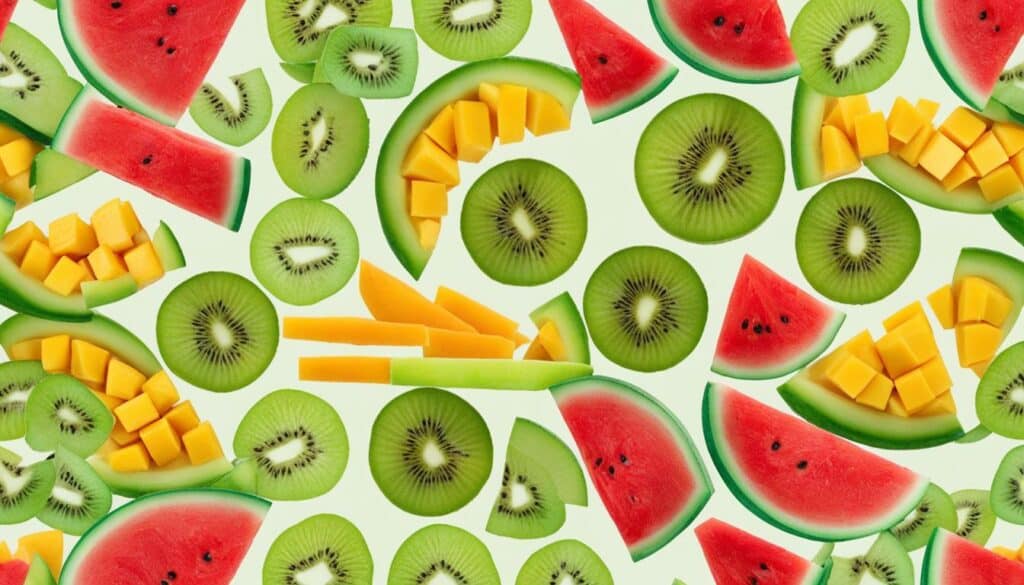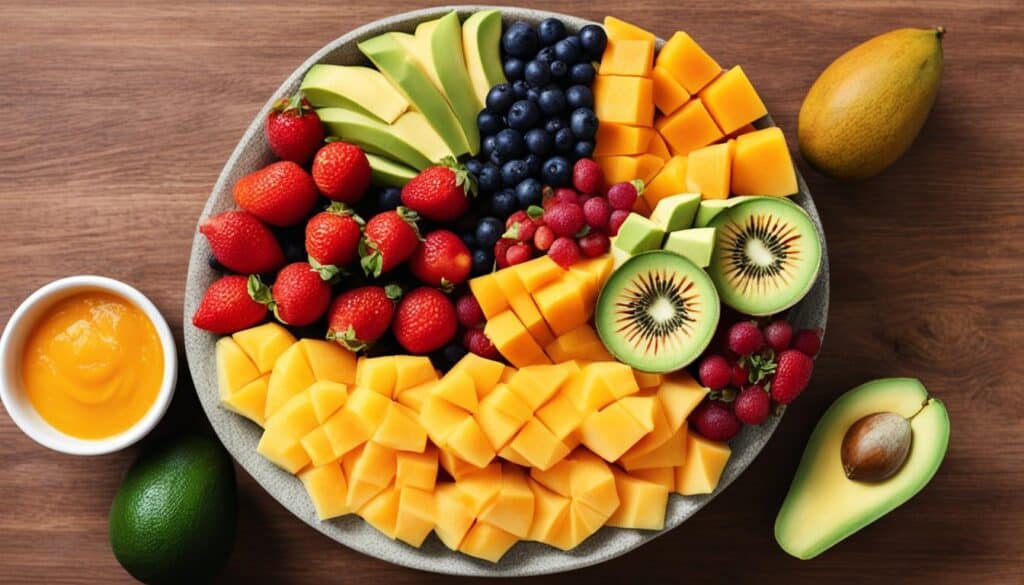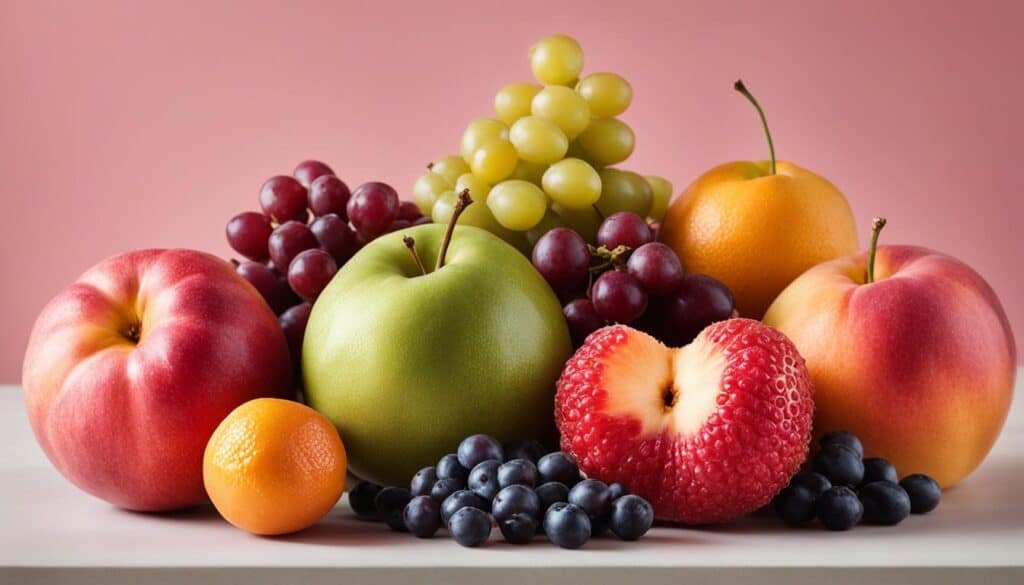Are you looking for fruits that are gentle on your stomach and won’t cause acid reflux or other digestive issues? In this guide, I will explore the top non-acidic fruits that are not only delicious but also promote overall health. Non-acidic fruits, also known as low-acid or alkaline fruits, have a higher pH level, which means they are less likely to cause discomfort or irritation for those with sensitive stomachs.
Choosing the right fruits can make a big difference in how you feel after a meal. Acidic fruits, such as citrus fruits, can exacerbate symptoms of acid reflux and heartburn. By opting for non-acidic fruits, you can enjoy a wide range of flavors and textures without worrying about digestive discomfort.
Key Takeaways:
- Non-acidic fruits, also known as low-acid or alkaline fruits, have a higher pH level and are gentle on the stomach.
- Choosing non-acidic fruits can help alleviate digestive issues such as acid reflux and heartburn.
- Some examples of non-acidic fruits include bananas, apples, watermelon, papaya, and mango.
- Non-acidic fruits are generally low in calories and high in fiber, making them a great choice for weight loss.
- Incorporating non-acidic fruits into your diet can support a healthy digestive system and promote overall well-being.
Why Choose Non-Acidic Fruits?
Are you suffering from acid reflux, heartburn, or other digestive issues? Consuming acidic foods can worsen these conditions, causing discomfort and irritation. However, there is a solution: non-acidic fruits. These fruits have a higher pH level, making them less likely to trigger digestive problems. By choosing non-acidic fruits, you can alleviate discomfort and promote overall well-being.
Non-acidic fruits, also known as low-acid or alkaline fruits, are a great alternative for individuals with sensitive stomachs. They offer a range of health benefits while being gentle on the digestive system. Here are a few reasons why you should consider incorporating non-acidic fruits into your diet:
- Gentle on the stomach: Non-acidic fruits have a higher pH level, which means they are less likely to cause discomfort or irritation in the stomach. They can help soothe acid reflux and reduce the risk of heartburn.
- Promote digestion: Non-acidic fruits contain essential nutrients and dietary fiber, which support healthy digestion. They can aid in regulating bowel movements and preventing constipation.
- Alkalizing effect: Non-acidic fruits have an alkalizing effect on the body. They can help balance the pH levels and promote a more alkaline environment, which is believed to support overall health.
By choosing non-acidic fruits, you can enjoy a variety of delicious options while taking care of your digestive health. Incorporate fruits like bananas, apples, watermelon, papaya, and mango into your daily diet to experience the benefits.
“I used to suffer from frequent acid reflux episodes, but ever since I started including non-acidic fruits in my diet, I’ve noticed a significant improvement. These fruits are gentle on my stomach and provide the right nutrients for a healthy digestive system.”
-Emily, Non-Acidic Fruit Advocate
So, why choose non-acidic fruits? Because they are a natural and delicious way to support a healthy digestive system and overall well-being. Don’t let digestive issues hold you back. Make the switch to non-acidic fruits and experience the difference.
The Power of Non-Acidic Fruits
Non-acidic fruits are packed with essential vitamins, minerals, and antioxidants that can boost your health. They offer a range of benefits, such as:
- Promoting a strong immune system
- Supporting healthy heart function
- Improving skin health and complexion
These fruits can also be enjoyed as part of a weight management plan due to their low calorie and high fiber content. They provide a feeling of fullness and satisfaction, making it easier to maintain a healthy weight.
Discover the power of non-acidic fruits and transform your eating habits for a healthier, happier you.
Top Non-Acidic Fruits
If you’re looking for delicious fruits that won’t cause any acidity or discomfort, here are some excellent options to consider:
- Bananas: Bananas are a popular choice for those seeking non-acidic fruits. They have a smooth, creamy texture and are rich in potassium.
- Apples: Apples are not only refreshing but also low in acid. They come in a variety of flavors and textures, making them a versatile addition to your diet.
- Watermelon: Watermelon is a hydrating fruit with a sweet and juicy taste. It’s also non-acidic, making it a perfect choice for those with acid sensitivities.
- Papaya: Papaya is not only a tropical treat but also a non-acidic fruit. It contains an enzyme called papain, which aids digestion.
- Mango: Mangoes are not only delicious but also low in acid. They are packed with vitamins and minerals, making them a nutritious choice.
These non-acidic fruits can be enjoyed on their own as a healthy snack, added to smoothies, or used in various culinary creations to enhance flavor and nutrition.
Remember, incorporating non-acidic fruits into your diet can help promote a healthy digestive system and overall well-being.
| Fruit | Acidity Level |
|---|---|
| Bananas | Low |
| Apples | Low |
| Watermelon | Low |
| Papaya | Low |
| Mango | Low |
Can I eat citrus fruits if I have acid reflux?
If you suffer from acid reflux, you may be wondering if it’s safe to consume citrus fruits like oranges, lemons, and grapefruits. While these fruits are undeniably delicious and packed with nutrients, their high acidity can trigger acid reflux in some individuals. It is best to exercise caution and limit consumption of citrus fruits if you have acid reflux to prevent worsening of symptoms.
When it comes to acid reflux, the pH level of foods plays a crucial role. Citrus fruits have a low pH level, which means they are highly acidic. Consuming these fruits can lead to an increase in stomach acid, triggering heartburn or regurgitation. Avoiding or minimizing the intake of citrus fruits can help reduce the risk of acid reflux symptoms.
If you still want to enjoy the tanginess of citrus fruits, there are a few things you can do to make them more stomach-friendly. Firstly, opt for ripe citrus fruits as they tend to be less acidic. Additionally, consider consuming smaller portions or diluting the citrus juice with water to help lessen its acidity.
It’s important to note that everyone’s tolerance for citrus fruits may vary. While some individuals with acid reflux may experience discomfort after consuming even small amounts of citrus, others may be able to enjoy them in moderation without any issues. It’s best to listen to your body and consult with a healthcare professional if you have concerns.
“While citrus fruits can be a refreshing and nutritious choice, their acidity may pose challenges for individuals with acid reflux. It’s advisable to limit the consumption of citrus fruits and explore other low-acid alternatives to support better digestive health.”
If you’re craving the taste of citrus but want to avoid acid reflux triggers, there are several delicious non-citrus fruits you can enjoy instead. These fruits offer a range of flavors and nutrients without the high acidity that can irritate your stomach. Here are a few non-citrus fruits to consider:
- Bananas
- Apples
- Watermelon
- Papaya
- Mango
By incorporating these non-citrus fruits into your diet, you can satisfy your fruit cravings while minimizing the risk of acid reflux symptoms. Remember, everyone’s body is different, so it’s essential to pay attention to how your body reacts to different foods and make choices that work best for you.
Are all berries acidic?
When it comes to berries, not all of them have the same level of acidity. While some berries like strawberries and raspberries are considered acidic fruits, others like blueberries and blackberries fall into the category of low-acid fruits. It’s important to be mindful of the acidity of berries, especially if you have acid reflux or other digestive issues.
If you’re prone to acid reflux or have a sensitive stomach, opting for low-acid berries is a smart choice. Blueberries and blackberries, for example, are known for their lower acidity compared to other berries. These low-acid fruits are gentler on the digestive system, making them a suitable choice for individuals who experience discomfort or irritation after consuming acidic foods.
By choosing low-acid berries, you can still enjoy the delicious flavors and health benefits that berries offer without compromising your digestive comfort. Incorporating a variety of low-acid berries into your diet can provide you with essential vitamins, minerals, and antioxidants while minimizing the risk of triggering acid reflux or other digestive problems.
So, the next time you’re shopping for berries, remember to consider their acidity level. Opt for low-acid options like blueberries and blackberries to ensure a more enjoyable and gentle eating experience.
Can non-acidic fruits help with weight loss?
When it comes to weight loss, incorporating non-acidic fruits into your diet can be a delicious and nutritious way to reach your goals. Non-acidic fruits are not only low in calories but also high in fiber, making them an excellent choice for promoting weight loss.
These fruits, such as apples, bananas, watermelon, papaya, and mango, provide essential nutrients while keeping you feeling full and satisfied. Their high fiber content helps regulate digestion and promotes a healthy gut, which is crucial for weight management.
By adding non-acidic fruits to your meals and snacks, you can enjoy a variety of flavors while keeping your calorie intake in check. Whether you prefer them raw, blended into smoothies, or tossed into salads, non-acidic fruits offer versatility and taste that can support your weight loss journey.
In addition to their weight loss benefits, non-acidic fruits also provide essential vitamins and minerals that contribute to overall well-being. They contain antioxidants, which help protect the body against harmful free radicals and reduce inflammation.
To give you a better idea of the calorie content of common non-acidic fruits, here’s a table highlighting their approximate calorie count per 100 grams:
| Fruit | Calories per 100g |
|---|---|
| Apple | 52 |
| Banana | 96 |
| Watermelon | 30 |
| Papaya | 43 |
| Mango | 60 |
Remember, weight loss is a combination of healthy eating, regular physical activity, and lifestyle choices. While non-acidic fruits can be a valuable addition to your weight loss plan, it’s essential to maintain a balanced diet and consult with a healthcare professional or registered dietitian for personalized guidance.

Expert Insight:
“Incorporating non-acidic fruits into your weight loss diet is a smart choice. They are low in calories, rich in fiber, and packed with essential nutrients. Including a variety of non-acidic fruits can help you stay on track with your weight loss goals while enjoying a wide range of flavors and textures.” – Dr. Julia Thompson, Registered Dietitian
So, if you’re looking to shed some pounds while enjoying a sweet and satisfying snack, reach for non-acidic fruits. They offer a guilt-free way to lose weight and nourish your body with the goodness of nature.
Conclusion
Including non-acidic fruits in your diet is a smart choice for maintaining a healthy digestive system and overall well-being. Bananas, apples, watermelon, papaya, and mango are just a few examples of delicious and non-acidic fruits that you can enjoy. Remember to listen to your body and choose fruits that work best for you. Start incorporating these fruits into your diet today and experience the benefits of a balanced and alkaline lifestyle.
When it comes to enjoying fruit without acid, there are plenty of options to satisfy your taste buds. Whether you prefer a sweet and juicy apple, a creamy and rich mango, or a refreshing watermelon, there’s a non-acidic fruit out there for everyone. These fruits not only provide essential vitamins, minerals, and antioxidants, but they also support good digestion and promote overall health.
By choosing acid-free fruit, you can avoid the discomfort of acid reflux, heartburn, and other digestive issues. These low-acid fruits have a higher pH level, making them gentle on your stomach and less likely to cause irritation. Incorporating non-acidic fruits into your diet can help prevent digestive discomfort and promote a happier and healthier you.
The Benefits of Non-Acidic Fruits
Non-acidic fruits, sometimes referred to as low-acid or alkaline fruits, have several benefits for your health:
- Relief from digestive issues: Acid reflux, heartburn, and other digestive problems can be alleviated by consuming non-acidic fruits that have a higher pH level.
- Reduced inflammation: Non-acidic fruits can help reduce inflammation in the body, which is linked to various health issues.
- Improved digestion: These fruits are gentle on the stomach and promote healthy digestion by providing fiber and essential nutrients.
- Enhanced immune system: Non-acidic fruits are packed with antioxidants and vitamins that support a strong immune system, helping you stay healthy.
- Weight management: Many non-acidic fruits are low in calories and high in fiber, making them a great choice for weight loss or weight maintenance.
By incorporating non-acidic fruits into your daily diet, you can enjoy their numerous health benefits and support your overall well-being. Remember to choose a variety of fruits to ensure you get a wide range of nutrients.
So why wait? Start reaping the benefits of fruit without acid today. Enjoy the delicious flavors of non-acidic fruits while promoting a healthy digestive system and a balanced lifestyle.

Incorporating Non-Acidic Fruits into Your Diet
Now that you have discovered the benefits of non-acidic fruits, it’s time to explore how you can incorporate them into your daily diet. Here are some practical tips:
- Start your day with a refreshing fruit salad. Mix together slices of banana, watermelon, and apple for a delicious and non-acidic breakfast.
- Swap acidic fruits like oranges and lemons with alkaline alternatives such as papaya and mango in your smoothies. Add a handful of spinach or kale for an extra nutritional boost.
- Snack on non-acidic berries like blueberries and blackberries throughout the day. They are not only tasty but also packed with antioxidants.
- Include non-acidic fruits in your desserts. Top a bowl of low-fat yogurt with slices of kiwi and pear for a guilt-free treat.
- Experiment with different fruit combinations. Mixing non-acidic fruits together can create unique flavors and add variety to your meals.
Remember, a balanced diet is key. While non-acidic fruits are beneficial for your digestive health, it’s important to include a variety of other fruits, vegetables, and whole grains in your diet for overall nutrition.
Quote of the Section:

I love incorporating non-acidic fruits into my meals. They not only taste great but also make me feel good from the inside out. Plus, they add a burst of color to my dishes! – Rebecca
| Fruit | Taste | Potential Health Benefits |
|---|---|---|
| Banana | Sweet and creamy | Rich in potassium and vitamin B6, helps supports heart health and aids digestion |
| Apple | Crunchy and slightly tart | Packed with fiber, antioxidants, and vitamin C, promotes gut health and boosts immunity |
| Watermelon | Juicy and refreshing | High water content, hydrates the body and contains lycopene, a powerful antioxidant |
| Papaya | Sweet and tropical | Rich in digestive enzymes and vitamin C, aids digestion and supports immune function |
| Mango | Sweet and juicy | Loaded with vitamin A and fiber, promotes eye health and aids digestion |
By incorporating these non-acidic fruits into your diet, you can enjoy their delicious flavors while reaping the benefits of their nutritional value. Get creative in the kitchen and explore the wide range of possibilities these fruits offer.
Section 9: Exploring the Health Benefits of Non-Acidic Fruits
When it comes to choosing fruits that are gentle on the stomach and promote overall health, non-acidic options are a great choice. By opting for non-acidic fruits, you can enjoy delicious flavors without worrying about acid reflux or other digestive issues. These fruits have a higher pH level, which means they are less likely to cause discomfort or irritation for those with sensitive stomachs.
There are numerous health benefits associated with incorporating non-acidic fruits into your diet. These fruits are not only refreshing but also packed with essential nutrients that support a healthy lifestyle. They are low in calories and high in fiber, making them an excellent choice for weight management. Additionally, non-acidic fruits can contribute to improved digestion, boosted immunity, and enhanced energy levels.

Let’s take a closer look at the health benefits of some popular non-acidic fruits:
| Fruit | Health Benefits |
|---|---|
| Bananas | Rich in potassium, promotes heart health |
| Apples | High in fiber, aids digestion |
| Watermelon | Hydrating, supports healthy skin |
| Papaya | Contains digestive enzymes, eases constipation |
| Mango | High in antioxidants, boosts immune system |
These fruits not only taste great but also offer a wide range of health benefits. Incorporating them into your diet is a simple way to support your overall well-being. Whether you enjoy them as a snack, in smoothies, or as part of a balanced meal, non-acidic fruits are a delicious and nutritious addition to any diet.
Exploring the Health Benefits of Non-Acidic Fruits
When it comes to maintaining a healthy lifestyle, incorporating non-acidic fruits into your diet is a smart choice. These fruits not only provide a burst of flavor but also offer numerous health benefits. Let’s dive into the world of non-acidic fruits and discover how they can contribute to your overall well-being.
Gentle on the Stomach
Unlike their acidic counterparts, non-acidic fruits have a higher pH level, making them gentle on the stomach. If you struggle with digestive issues such as acid reflux or heartburn, incorporating more non-acidic fruits into your meals can help alleviate discomfort and promote better digestion.
Promote Hydration and Detoxification
Many non-acidic fruits, like watermelon and grapes, have a high water content, which helps you stay hydrated throughout the day. Additionally, these fruits can aid in detoxification by flushing out toxins from your body, promoting healthy skin, and supporting proper organ function.
“Non-acidic fruits are nature’s refreshing solution for a well-hydrated and toxin-free body.”
Rich in Nutrients
Non-acidic fruits, such as bananas, papaya, and mangoes, are packed with essential vitamins, minerals, and antioxidants. These nutrients play a crucial role in supporting your immune system, reducing inflammation, and promoting overall health and vitality.
Weight Management Support
If you’re looking to shed a few pounds or maintain a healthy weight, non-acidic fruits can be your ally. These fruits are generally low in calories and high in fiber, allowing you to feel full and satisfied without consuming excessive calories. Incorporate them into your snacks or as a part of balanced meals to support your weight management goals.
Boost Your Mood
Non-acidic fruits, such as berries and cherries, are known to boost your mood and enhance mental well-being. Packed with antioxidants and phytochemicals, these fruits contribute to a healthy brain, reducing the risk of neurodegenerative diseases and promoting a positive mindset.

As you can see, non-acidic fruits offer a range of health benefits, from supporting digestion to promoting hydration and providing essential nutrients. By incorporating these fruits into your diet, you can take a step towards a healthier lifestyle. Experiment with different varieties, enjoy their delicious flavors, and reap the abundant rewards they offer.
Exploring the Benefits of Non-Acidic Fruits
When it comes to choosing fruits for a healthy diet, non-acidic options can provide a range of benefits. These fruits, also called low-acid or alkaline fruits, have a higher pH level, making them gentler on the stomach and less likely to cause digestive discomfort. By incorporating non-acidic fruits into your daily routine, you can enjoy a variety of delicious flavors without worrying about acid reflux or other digestive issues.
Including non-acidic fruits in your diet can lead to improved digestion and overall well-being. These fruits are not only rich in essential nutrients but are also low in calories and high in fiber, making them a great choice for weight loss and maintaining a healthy weight. Additionally, non-acidic fruits like bananas, apples, watermelon, papaya, and mango offer a sweet and refreshing taste, making them a satisfying snack or addition to any meal.
If you have been experiencing discomfort from consuming acidic foods or have been diagnosed with acid reflux, opting for non-acidic fruits can provide relief and promote a balanced lifestyle. Remember to listen to your body and choose fruits that work best for you. With a wide range of non-acidic fruits to choose from, you can find delicious options that support your digestive health and overall wellness.
FAQ
Are non-acidic fruits suitable for individuals with sensitive stomachs?
Yes, non-acidic fruits, also known as low-acid or alkaline fruits, are gentle on the stomach and are less likely to cause discomfort or irritation for those with sensitive stomachs.
Can non-acidic fruits help alleviate digestive issues?
Yes, choosing non-acidic fruits can help alleviate digestive issues such as acid reflux, heartburn, and other digestive problems.
Can I eat citrus fruits if I have acid reflux?
It is best to avoid or limit the consumption of citrus fruits like oranges, lemons, and grapefruits if you have acid reflux, as they are highly acidic and can trigger symptoms.
Are all berries acidic?
While some berries like strawberries and raspberries are acidic, others like blueberries and blackberries are considered low-acid fruits. It is important to choose berries based on your sensitivity.
Can non-acidic fruits help with weight loss?
Yes, non-acidic fruits are generally low in calories and high in fiber, making them a great choice for weight loss. They can help you feel full and satisfied while providing essential nutrients.





Leave a Reply